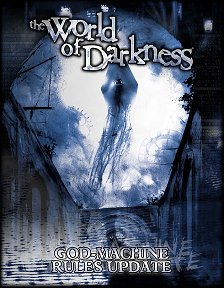
This is the 'crunchy' appendix 'World of Darkness Rules Revisions' from The God-Machine Chronicle, released as a free download, and very useful it is too. Perhaps you are happy with your own chronicles and don't want to buy the full book, but even if you are using The God-Machine Chronicle most of it is 'Storyteller eyes only' whilst this material is useful to players - so send them to download this (as my Storyteller did a year ago) and they can have access to all the new rules mechanics without the temptation to read bits they ought not to see!
Since the New World of Darkness Core Rulebook was published in 2004, a huge number of books have come out to support the line, many of which have contained new rule mechanics to support whatever is presented in that book. Many of them, such as spirits (originally in Werewolf: The Forsaken), shards (Mirror), tiers (Hunter: The Vigil) and other mechanics have spread to other games in the line, becoming a general part of the New World of Darkness even though the core ruleset has remained the same. The material in this book is intended to draw all these strands together and present a new definition of the core rules, to be used throughout the line for future materials.
So, what's here? First of all, we look at Character Creation and Advancement. Start with the rules in the core rulebook, but apply these modifications and additions. New bits include Aspirations, where you set short- and long-term goals for your character and help develop his personality (and give the Storyteller hints as to opportunities you might like to have in future plots). There's an update to the Virtue and Vice rules, freeing you up from a set list and providing guidance on creating personalised ones instead. Their use has also been modified so that fulfilling a Virtue gives a full refresh to Willpower because your character feels so darn good about it, whilst fulfilling a Vice just restores a single point as he asserts his inner nature. There are examples to help (or use) of course. This section also introduces the concept of a Breaking Point and talks about experience.
Next comes a section on Merits, which replaces the Merits section of the core rules entirely. It includes most of the Merits from the core rulebook and those introduced in subsequent publications, and there's plenty of advice on how to use them in play.
This is followed by Conditions. These add an additional layer of consequence and reward to certain actions, but are based on circumstances rather than something you choose for yourself. They are temporary, being resolved by the effect that causes the Condition or the terms of the Condition itself (and when you resolve one you get a Beat towards your experience total). Some, however, are persistent - irrovocably linked to a character - and there's a subset called Tilts which are used in combat.
Then we meet Integrity. This replaces Morality as a guage of how a character's behaviour affects their psyche. There's a lengthy explanation of why Morality needed replacing due to the inconsistencies and oddities it produced. When you do something which hits a Breaking Point (as determined earlier), this may affect your Integrity.
Other things covered include Soul Loss (something to be avoided), Extended Actions (replacing the core rulebook mechanics for determining them) and Social Manoeuvering (also replacing the original rules for Social actions). This last is particularly comprehensive, but care needs to be taken that die-rolling doesn't replace role-playing. Used well, it will enhance it.
The next part of the book is given over to Combat and other ways of doing harm to characters (environmental dangers, illness, poisons, etc.). It makes combat even deadlier, something to be avoided where possible but very effective when you do engage in it. One interesting point is Intent: what does each participant actually want to get out of the fight, what are they fighting for? Defining your objective goes a long way to focussing the combat and provides a way of determining when an opponent will give up - some things just aren't worth dying for, even if someone thinks they are worth killing for. It makes combat more meaningful and integral to the plot rather than there just because, well, if there aren't a few brawls it's not a role-playing game.
Then come Ephemeral Beings: Ghosts, Spirits, and Angels. This provides a unified system of rules for all manner of ghosts (and can also be applied to God-Machine angels). Manifestations, possession and more are covered here, with effective use of Conditions to moderate what is going on when some spook comes a-calling. Neat. Finally, there's a comprehensive selection of Equipment of all kinds, find the right tool for the job here.
This part of The God-Machine Chronicles was written as Onyx Path Publishing was struggling to get permission to produce a second edition of the New World of Darkness Core Rulebook at the time. It's an excellent revision based on years of development and play, and well worth considering - and necessary if you want to use the Second Editions of the various game lines, as these rules are assumed to be in force. And it's free!
Return to God-Machine Rules Update page.
Reviewed: 22 January 2016

